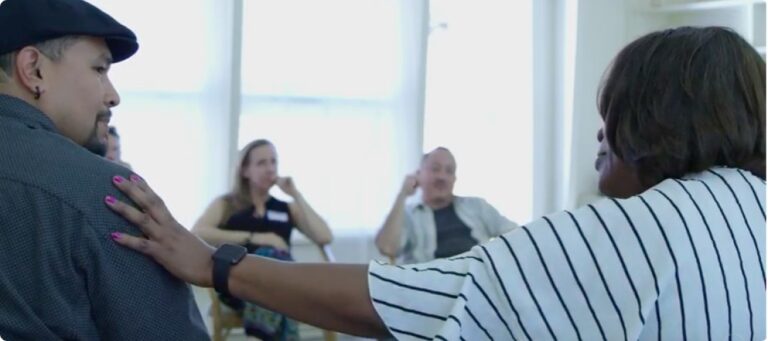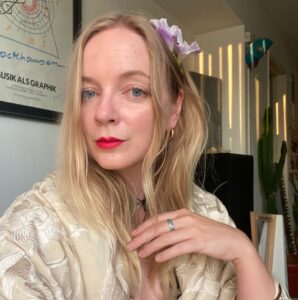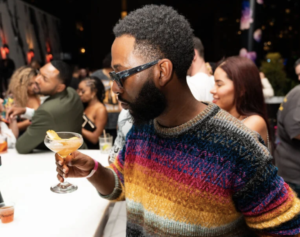The 2016 presidential election was a turning point for Maria Schnair. Then a student at the Middlebury Institute of International Studies in Monterey California, Donald Trump’s win opened her eyes to a different political current and sparked her curiosity.
”The 2016 election really rocked my world,” says Schnair. “I felt very shocked and then I felt like I was part of the problem, because I was so shocked.” Schnair was eager to connect with those who voted differently, and to learn more about their beliefs.
On her college campus, however, curiosity was not the dominant theme. Division sprang up and drove apart classmates that had previously been perfectly cordial.
“All of a sudden your political party identification meant that today we’re enemies and I can’t even look at you, even though yesterday we were in class together and we were peers,” says Schnair. “That made me really interested in what’s happening in our country, and how I can be part of the solution.”
Schanir’s search for tools to create better dialogue eventually led her to the Center for Council. The organization is adept at helping people overcome divisions of the most extreme kind. Since the 1990s, the council’s founder Jared Seide has been facilitating dialogue between groups as diametrically opposed as warring gang members and the victims and perpetuators of genocide.
“This organization was addressing all of the issues that were important to me, everything that I saw falling apart. I just felt like there was no better place to be,” says Schnair, who is now the director of advancement at the center.
Everybody come together
The Center for Council’s approach is disarmingly simple. Participants sit in a circle, talk, and listen. This is called “council,” and there are only a few rules.
You must speak one at a time and only if you’re holding a designated talking staff, share personal stories and not opinions, and listen without judgment while others do the same. Council is not a therapy session or a religious meeting. The goal is simply to let people tell their stories while hearing others tell theirs.
Despite its simplicity, Seide has found council to be powerful enough to overcome even the most hardened divisions. He frequently hosts council in prisons, where members of disparate gangs sit in a circle together.
“In other circumstances they might be violently attacking one another, but in council they find a sense of shared humanity beyond their gang affiliation and their ethnic identity. This leads to really extraordinary relationships,” says Seide.
“Many of them come home after being paroled and continue to be friends and have barbecues together. We’ve seen those transformations happen over and over again.”
Seide first became interested in this sort of dialogue after experiencing serious strife at his daughter’s elementary school. It was shortly after riots erupted across Los Angeles in 1992, in response to the arrest and beating of Rodney King. The whole city seemed on edge and bullying at his daughter’s school was at an all time high.
“I was the president of the governing board of the school and thought: ‘What can I do to help this school repair its culture and find each other again as a community?’” says Seide. He’d heard about the practice of council, which other small schools in the area were already trying, and decided they should give it a go.
Within six months, the parents had gone from adversaries to prioritizing their children’s collective future together. Kids who were bullying each other sat down to listen and became much more empathetic. The experience “knocked his socks off,” admits Seide.
Out with the new, in with the old
Cultures around the world have long engaged in practices similar to council, from the Hindu “Satsang,” discussion and reflection on spiritual beliefs, to Sierra Leone’s “Fambul Tok” or “family talk” tradition. Our siloed, technologically-driven society leaves little room for this sort of listening, however.
“There are few spaces where people can come together and feel like our voice matters, to hear the truth of those we work with and live with,” says Seide. “I think many of the forces in the modern world in which we live push us to be really agitated about who’s with us and who’s against us. That’s not a good trend.”
In the late 1970s, The Ojai Foundation, eager to break down hierarchy in its organization, began to resurrect the practice of listening circles for the modern era. They cited indigeonous groups who held similar gatherings as their primary inspiration.
It was this foundation that first brought council into schools in Los Angeles, and how Seide became connected to the philosophy. Seide already had a passion for story-telling born from growing up in the bustling, diverse New York city of the 1980s.
“People were on top of each other all the time and you couldn’t help but be involved in the stories of so many folks,” he says. “It was such an extraordinary time. It created in me this love and passion for hearing diverse and resonant stories.”
He transferred this love first into acting, which brought him to Hollywood, and then later to his work hosting council. He received training at The Ojai Foundation, then established the Center for Council in 2014 to bring the practice to the broader world. He’s since hosted council with inmates, prison guards, police officers, corporate CEOs, and the perpetuators and survivors of the Rwandan genocide.
He’s found council to be universally helpful. “This is not the only silver bullet, but it’s definitely an effective way to nourish community and culture and create a world that feels more compassionate, engaged, positive, and healthy for everyone,” he says.
A real human being
Council seems to have endlessly evolving applications. During the COVID-19 pandemic, the center began bringing together overworked medical professionals for a course they dubbed Compassion, Attunement and Resilience for Healthcare Professionals or CARE. It’s meant to help build communication skills, cooperation, and professional well-being in an industry plagued by stress, high suicide rates, and burn out.
“Taking off the white coat and telling a story about your life with your colleagues feels like such an incredible relief to folks. At the same time, it can give you a sense that you have resources you didn’t realize were there,” says Seide.
You don’t have to be in crisis, or in conflict with your neighbor, to experience the benefits of council. The organization also hosts regular Social Connection Council gatherings on Zoom for anyone who’d like to experience a session.
It’s a practice also sparked by the pandemic, when so many were eager for connection but couldn’t gather in person. Seide was skeptical at first that Zoom could be a platform to host something they usually hosted face-to-face, but the power of council transcended even the dreaded “Zoom square” format.
These simple calls offer a radically different way of relating, says Schnair. “In our society, socializing is about proving yourself. You go to a party and people want to know your work title, what car you drive, who you voted for. When you reveal this, it decides whether someone wants to get closer to you,” says Schnair. “Council is about stripping you away from a category. It’s about taking you out of the box that you’ve been put in, and just letting you be a human being, sitting beside another human.”
Want to participate in a council? Follow Center for Council on Eventbrite.





